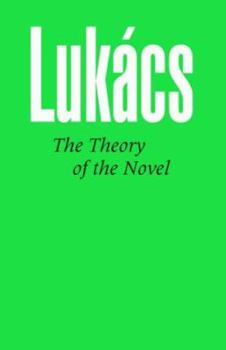The Theory of the Novel
Select Format
Select Condition 
Book Overview
Georg Luk cs wrote The Theory of the Novel in 1914-1915, a period that also saw the conception of Rosa Luxemburg's Spartacus Letters, Lenin's Imperialism: The Highest Stage of Capitalism, Spengler's... This description may be from another edition of this product.
Format:Paperback
Language:English
ISBN:0850362369
ISBN13:9780850362367
Release Date:January 1971
Publisher:Merlin Press
Length:164 Pages
Weight:0.55 lbs.
Age Range:18 years and up
Grade Range:Postsecondary and higher
Customer Reviews
2 ratings
German Romanticism melds into Western Marxism
Published by Thriftbooks.com User , 22 years ago
In this pre-marxist work of the Young Lukács, he takes advantege of the German Romantic myth of the Homeric epic as the hallmark of a supposedly "unalienated" civilization, where the individual was his envinronment and had no need to develop the kind of alienated, subjective self-consciousness we find in the bourgeois XIXth Century novel. Of course this is a modern myth, based on a very selective reading of Homer's epic - which already betrayed a clear consciousness of the divide existing between the Human and the Divine, as well as of a further divide between the mythical Heroic age and the everyday realities of an archaic class society. Neverthless, this modern myth came to form the core of Lukács' lifelong research programme - the study of alienation, which came to form much of the best research of Western Marxism (after reading Lukács'work one can not imagine Adorno and Horkheimer's _Dialectic of the Enlightnment_ being written without Lukács' starting stone). A must-read, therefore, for anyone interested in Western Marxism in general, as well as Lukács and the Frankfurt School in particular.
The epic and the novel
Published by Thriftbooks.com User , 24 years ago
The "Theory of the Novel" (1916) is the major work of Lukacs' pre-Marxist period. It is extremely useful both as a kind of document of the feverish intellectual atmosphere of pre-WW I Europe and as one of the underground classics (together with his "History and Class Consciousness" (1923)) that influenced what was later to become the Western Marxism of the Frankfurt School. Lukacs' pre-Marxist prose style, comparable to that of his friend Ernst Bloch's, may seem excessively romantic at times but the overall effect is that theory seems to come alive as the expression of a living human being undergoing an intense personal crisis. The first part of the book discusses the rise of the crisis of interpretation that is represented by the novel as a literary form when it is placed in contrast to the fullness of meaning perceivable in the earlier epic, the form which the novel presumably replaced. Lukacs' discussion of the fundamental dichotomy tearing apart at European civilization from within parallels kindred works such as Nietszches' "The Birth of Tragedy" (with its Apollonian/Dionysian schema) and Toennies' classic work of sociology "Gemeinschaft und Gesellschaft." Also instructive to the student of literature would be a comparison of Lukacs' model with that of Auerbach's "Mimesis" and Bakhtin's contrast of the epic and the novel. The second part of this book is an application of this binaristic framework to novels by Cervantes, Balzac, Flaubert, Goethe, Tolstoy and Dostoevsky. While this whole second part is incredibly rich in insights, Lukacs' application of the Bergsonian notion of time as duree to his study of Flaubert's "L'Education sentimentale" is particularly unforgettable. There, he writes: "Time is the resistance of the organic."





